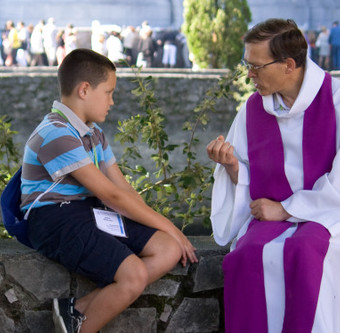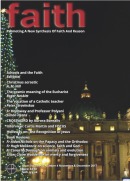
Editorial: Schools and the Faith
Editorial: Schools and the Faith
The Church was running schools across Britain long before there was any State involvement. There were Catholic schools even in the years when the Church was cruelly persecuted in Britain. In more recent times, Catholics ran schools from the early 19th century onwards, with some public funding from the 1850s. Large numbers of children were educated in this way. The State only caught up in 1870, by which time the Church had long led the way and set the tone and standards. Will our Catholic schools be allowed to continue in freedom?
OFSTED, the frequently jargon-laden bit of officialdom which inspects schools and declares them to be of an appropriate standard, seems to be confused about what it is allowed to do. There are reports of OFSTED inspectors demanding that schools impose a weird agenda on children, teaching that it is possible for a boy to become a girl and vice versa, that sexual identity is not something specific, that all our knowledge of biology on this subject has been wrong. It is difficult to recruit Catholic teachers: the collapse in Catholic practice over the past decades – noted repeatedly in FAITH magazine, where solutions to the problem are also always presented – means that the pool of available candidates is in any case small. Recruiting good head teachers is even harder – some local authorities have resorted to establishing networked schools with a head in charge of two or three at once. And will the system of public funding for Christian schools – centred on the fact that such schools existed long before those established by any other authority in Britain – cease if the schools insist on retaining their Christian identity?
Avoiding these questions by smugly announcing that we don’t need schools and that parents can teach their own children at home simply won’t do. We cannot consign children to a bleak future dependent on the whims of Mum’s latest boyfriend and occasional visits from a social worker committed to the sort of agenda described above. The Church has the right and duty to educate children, and has a special concern for the children of the poor – including the spiritually and culturally poor. For many, school will be the only place where they encounter God – who longs for them to be allowed to do so. Children who are privileged to have a faithfully married mother and father who are functionally literate and have a desire to instruct their offspring, and a commitment to the Church, are privileged indeed: for such children, home is already a place of education and spiritual nourishment. For the others – we must offer hope and practical assistance.
For decades, discussion about Catholic schools in Britain centred on demands for a fair share of the public funds available. Today this overlaps with debates about the actual content of religious education and about the freedom to offer children what the Church really teaches. We need a robust approach: Church-based schools are popular, sometimes embarrassingly so. People lie and fib in order to get their children into our schools. “Yes, Father, we are regular Mass-goers”. “Er...we’ve only just moved into the parish”. “Well, this is sort of our real address – we sort of live with my nan...” We must defend our schools with confidence and the knowledge that we are offering something that large numbers of people want. We must ensure that our Catholic schools teach Catholic doctrine, and uphold Catholic values – including the values that might clash with current trends in British society: marriage as the lifelong union of a man and a woman, the need for human life to be cherished from conception to natural death, the truth about our sexual identity as male or female. We must insist that Religious Education in Catholic schools is centred on the fullness of the Catholic Faith as expressed in the Catechism of the Catholic Church. As this first term of the School Year ends, our Catholic schools will be marking Advent and Christmas with carol services, Nativity plays, parties and celebrations. May they continue to be beacons of light in an often dark scene of moral and spiritual confusion in modern Britain.





